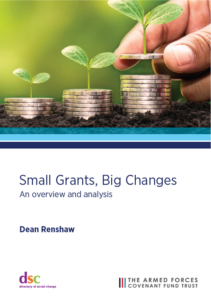Small Grants, Big Changes – discussing the value of small grants
We were delighted to attend a DSC Insight Talk in June which revealed new research into the value and use of small grants supporting charitable activity.

Small Grants, Big Changes, a report by the Armed Forces Covenant Fund Trust and the Directory of Social Change (DSC), examines small grants and small grants programmes via a literature review and a survey of organisations that had received or applied for small grants. The research has informed development of a Good Practice Framework which provides examples of good practice, the considerations needed when implementing these ideas, and the potential outcomes.
Jay Kennedy (Director of Policy & Research, DSC), Dean Renshaw (Data and Insight Lead, Open Door Charity) and Tom Traynor (Head of Impact, Armed Forces Covenant Fund Trust) spoke at the event which provided an overview of the key findings and recommendations highlighted in the report, plus an opportunity for further discussion.
Key findings and recommendations
The report identified a number of key findings including:
- There is no widely accepted definition of a small grant – the research identified grants ranging from £500 to £50,000 labelled as ‘small grants’
- There is very little publicly available research into small grants
- Small grants have a wide range of uses, from targeting hard-to-reach communities, foster partnerships and attract future funding, to covering core costs of existing projects
- Small grant monitoring can be disproportionate to the grant size
The report also makes recommendations that can improve knowledge about small grants, improve the application process for those applying, and improve the monitoring and evaluation process:
- if it’s a small grants programme, call it that
- make sure any evaluations are proportionate, but also published and accessible
- have multiple funding rounds, so applicants can apply when they are ready for the funding
- have a simple expression of interest to potentially save unnecessary time on full applications
pay small grants as quickly as possible.
Continuing the discussion
The event provided an opportunity for attendees to discuss the report findings and ask questions. Discussion started with a focus on the application process for small grants and the onus being on the funder to make sure they have the means in place for applicants to easily submit their application. Online applications forms are a useful tool, but it’s important to ensure these are user-friendly and accessible. Ensuring applicants can save as they go, and can access the application questions via a Word document or similar can make the application process more straightforward.
Attendees also discussed the monitoring and evaluation process, stressing the value of case studies and qualitative data, but also that there needs to be a balance between qualitative and quantitative data when reporting. It’s important to consider what tells the story best. Another consideration is the growing use and capabilities of AI – perhaps funders could utilise AI technology in helping with monitoring and evaluation in future.
Since Covid, some funders have reduced the need for complex monitoring in relation to small grants. Some have even trialled releasing the money straight away for lower value grants. Reduced monitoring requirements have proved popular with grant holders and has resulted in reduced workload for funders – it has even produced some valuable monitoring data which may not have been received through other means.
The importance of building a relationship between grant holders and the funder was highlighted throughout the discussion. Zoom and other online communication platforms have proved useful here as funders can now offer online meetings and surgeries. This helps make funders more accessible and maintains communication.
The Covid-19 pandemic has also caused a shift away from project funding, with many more applicants seeking funding to cover core costs. The rising cost of living has become more of a focus for funders in recent years. It’s important to work with the communities you want to support and identify what needs they have and recognise that those needs may change over time.
Tom Traynor, Head of Impact, Armed Forces Covenant Fund Trust, said: ‘I was delighted to be part of this discussion with DSC about small grants and small grant programmes, and the vital role they have in the voluntary sector. Thanks to DSC for their insightful report on this topic, funded by the Armed Forces Covenant Fund Trust, which we will use to inform future practice. We commend it to other funders too.’
Next steps
We encourage you to read the findings and recommendations from this report. It includes the experiences and opinions of representatives from organisations who have applied and received small grants. It provides a valuable resource for charities, government and policy makers alike, to improve understanding of small grants and small grant programmes.